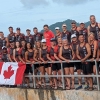Growing up in a small town in central Ontario, there weren't many opportunities for women and girls to participate in team sports. It seemed the prevailing thinking from much of the community was that girls didn't want to be hockey players. Instead, they either dated them or became figure skaters.
This mindset gave young girls in my generation less exposure to competitive sports, and that limited the opportunity for them to build foundational skills early on that would later help them find their voice in team settings, take on leadership roles, or set them apart in the workplace.
Thankfully, we've come a long way since then. Women and girls have access to more sports programming than ever before, and nearly half of all Canadian women (49%) over the age of 15 now participate in sports, according to a report from Statistics Canada.
On a global level, the 2024 Summer Olympic Games in Paris will represent the first time there will be numerical gender parity between men and women at the Games. According to a report from the World Economic Forum, the last time the Olympics were held in Paris in 1924, just 4.4% of the athletes were women.
Still, we have a long way to go. While girls' participation rates in sports held steady through the COVID-19 pandemic, participation rates remain lower than boys’, with roughly half of girls not participating in sports by the time they reach adolescence, according to a report from Canadian Women and Sport.
I know firsthand how valuable it can be for women to participate during their developmental years. My daughter grew up playing competitive hockey and it was clear to me the positive impact sports can have on a person's development. I saw how she and her teammates learned the values of teamwork, confidence, communication, and accountability many years before I did, and the opportunities that came to her as a result.
With the eyes around the world now fixed on the Paris games, it got me thinking about ways in which sports, and the skills and traits it instills in people, help to shape women leaders in the professional world. And while we don’t all have to be athletes to succeed – I assure you I am still much more comfortable in the stands at any sporting event – there are some valuable lessons to learn from women in sports that can help us all perform better in our careers.
In the spirit of the Games, three talented women from TD who competed in sports on an international level shared some insights from their athletic journeys that can help us continue to "level the playing field" for women on and off the field (sports pun intended).
Marianne Internicola
HR Business Partner
TD Securities, Global Markets
Marianne Internicola put her paddles in the water for the first time nearly 25 years ago when she joined a TD-sponsored dragon boat team.
Prior to joining the TD team, Internicola had wrestled with imposter syndrome as far back as her elementary school days, where she considered herself a "non-athlete," not confident putting herself out there to win. But after watching a friend paddle for the team, she just decided to give it a shot.
“This decision completely changed my life,” she said.
Being a part of the dragon boat team inspired her to make changes in other areas of her life. She started working out more. She quit smoking. She was eating better and sleeping more.
"For so many years, I couldn't make those changes for myself, but I found I would do it for the team when I knew others were counting on me," she said.
That commitment to her team took Internicola all the way to the International Dragon Boat Federation (IDBF) World Dragon Boat Racing Championships in Pattaya, Thailand in 2023. It was there she competed for Team Canada, and along with her team, placed first overall.
These days, Internicola acknowledges that her experience with the sport of dragon boating has not only taught her about the importance of teamwork, equity, and mentorship, but has also helped her with her feelings of imposter syndrome, which translated into increased confidence in the workplace.
"Imposter syndrome is one of those things that is fairly common in the workplace," she said. "We sometimes feel like we have to tick all of the boxes in order to put our hand up, whether it’s leading a project or it’s a promotional opportunity."
Internicola says she would not be where she is today without team members who took her under their wing. “I owe so much to them and the way they pushed me to do more than I ever thought I could.”
Sarah Miller
Communications Manager
Corporate & Public Affairs
Cold, wet, and alone atop a 10-metre diving platform, Sarah Miller found herself.
Despite being an elite athlete all her life – first as a gymnast and then as a diver competing for Canada on the world stage – Miller faced personal struggles that threatened to derail her athletic career, while competing for Canada internationally, and at Penn State on an NCAA Division 1 scholarship.
“Candidly, my early learnings weren’t all positive in gymnastics—body dysmorphia and an ongoing battle with eating disorders were part and parcel of my gymnastics experience,” she said.
"But it was through those challenges that I learned to look adversity in the eyes, and it taught me that we are never defined by what other people think of us… it's a lesson I reinforce with my kids to this day."
Eventually, her training as a gymnast led her to transition to the sport of diving when she was in her late teens. Not only did she make a national team in a second sport, Miller says what she found in diving was self-acceptance.
“I finally made peace with my body,” she said. “Sport gives you space and time to filter, to triage. Those concrete platforms are 33 feet in the air, so you learn pretty quickly what to prioritize and what to let go of. This mindset can also be critical in a fast-paced work environment.”
These days, as she trains for a triathlon, Miller believes that sports play a critical role in combating stress and anxiety, which she says is common amongst elite athletes and Type-A overachievers in the workplace.
Miller credits her training in the world of sports with not only helping to prepare her for the corporate world, but also helping her as she battled cancer.
“I would easily attribute the life lessons I learned in sport as being the most helpful thing to me when coping though issues with my health," she said. “Sport taught me the importance of being present, practicing mindfulness, and using visualization techniques to ensure I'd get the end result I wanted. I used those same techniques through both my cancers.”
Jessica Adamietz
Specialized HR Manager
Colleague Benefits Program
Sports helped Jessica Adamietz learn to embrace "the pivot."
Growing up, Adamietz started rowing in high school, and eventually worked her way up to joining the U.S. junior rowing team, training out of Lake Placid, N.Y. Ultimately, she was recruited to join the rowing team at the University of California, Berkeley, on a full scholarship.
For Adamietz, rowing is the ultimate team sport, where success is defined by how the group is able to achieve a goal. But sports also taught her how to fail, and to learn from disappointment. In her early rowing years, Adamietz said she won every event. But as she progressed, and found herself competing against elite athletes, she won less and less as the competition grew stronger.
“You need to have a learning mindset,” Adamietz said. “You have to be able to pivot your strategy.”
This wasn’t Adamietz’s first pivot. While rowing in college, she tore her intercostal, which is the muscle group that attaches your lungs to your rib cage. Every time she breathed in deeply, she faced the potential consequence of a rib fracture. Adamietz felt strong in her arms, her legs, and her brain, but she was constricted by the breathing pattern aroused by exercise.
The injury eventually led her to switch sports, where she landed a spot on the freestyle skiing team at Berkeley.
Indeed, that willingness to embrace change helped Adamietz land her current role with TD. Before taking a job in the financial industry, she had spent 10 years in the hospitality industry, working as a front office agent and office manager for a luxury hotel in Napa, Calif. When she applied to TD, she knew she didn't tick all the conventional boxes for her role, but she also knew she would be a good fit for the position.
Her history of changing her game plan with sports helped her navigate change in other walks of life. “Change is constant and no matter how fantastic a plan is there are always unforeseen hurdles or curveballs. Being able to pivot quickly, stay positive, and keep my eye on the end goal is something I learned how to do in sports that I use all the time.”
She believes her time in sport helped her call into question whether her hesitancy to apply for the role was real, or a self-imposed barrier.
"You have to ask yourself: do you believe this is an opportunity that you could excel at, and can you prove your excellence at?" she said.















